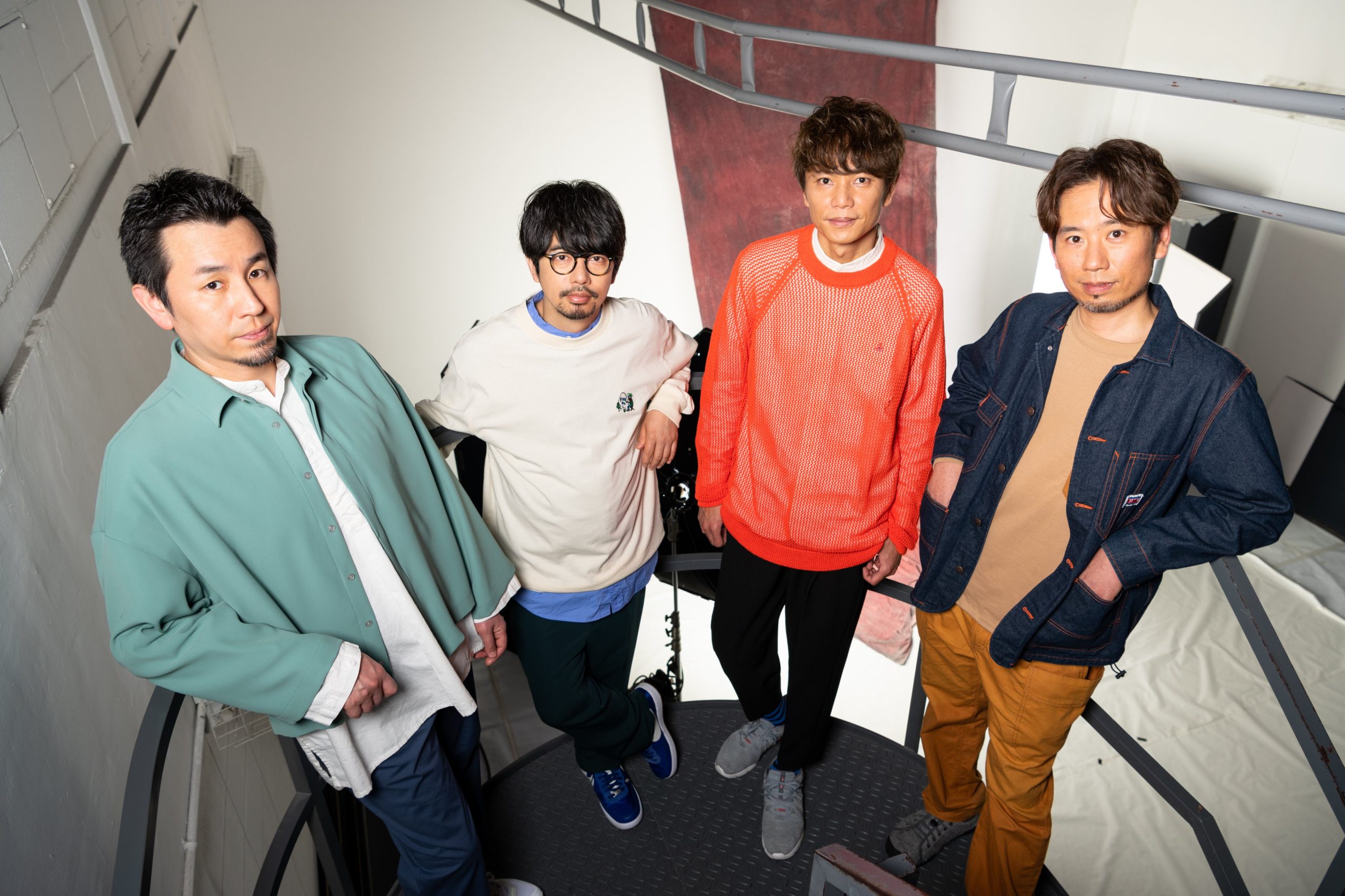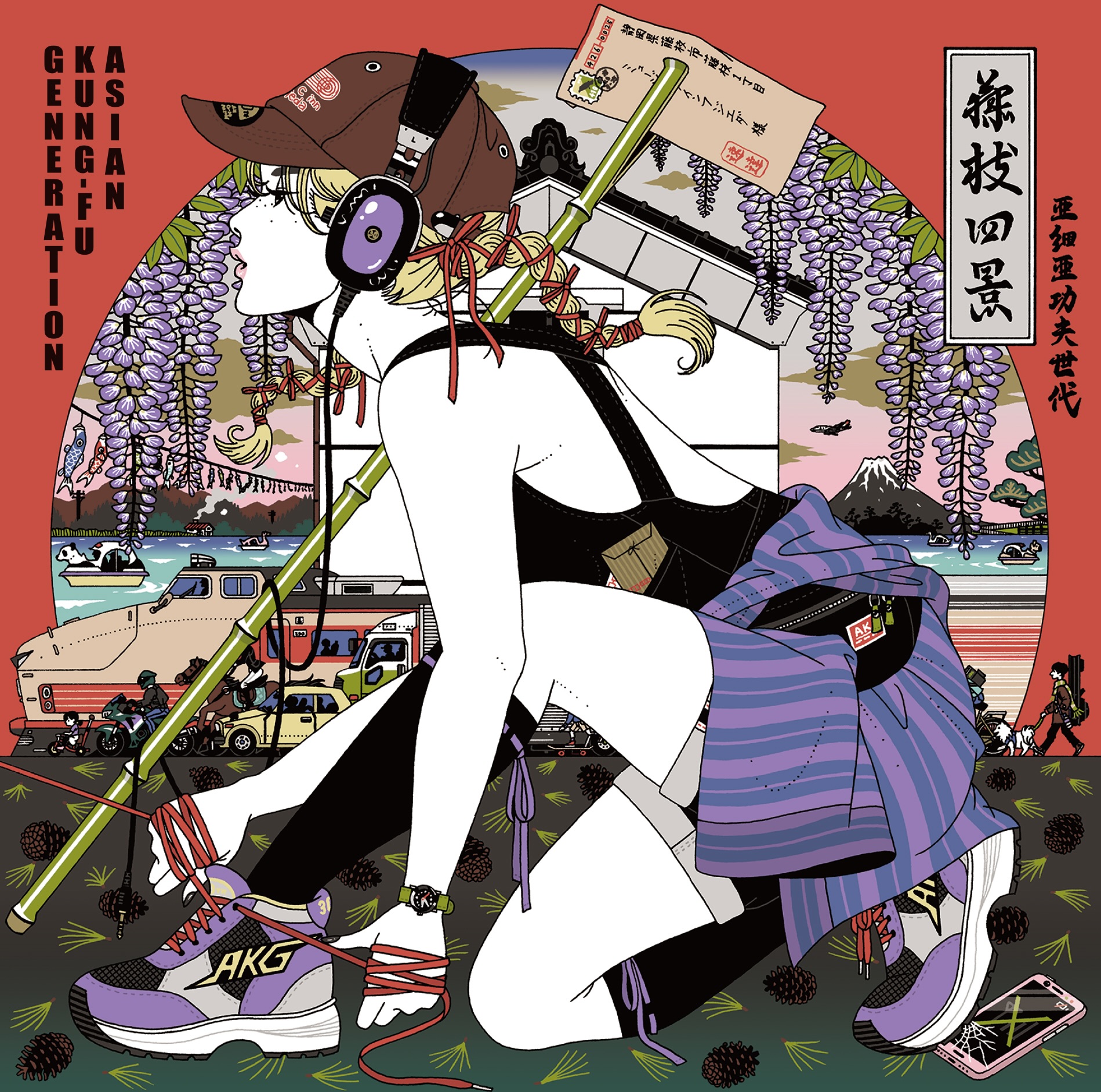Shonen Jump Interview

This interview was published in Weekly Shonen Jump #26 in 2022.
The kings of the rock world! Ajikan (Asian Kung-Fu Generation) visit Jump!! Looking back to the time they started and discussing the band!
Our music brought us here!
Please tell us how each of you started doing music before you met in the university’s music club.
Kita: I started playing the guitar in the 3rd year of high school under my friend’s influence. I enjoyed copying the Blue Heart’s songs and writing my own with simple chords, so I decided to join a light music club at university.
Yamada: I wasn’t interested in playing until I listened to the Beatles, and I was fascinated with musical instruments, so I started playing in high school. I had chosen Music as my elective class, and there were so many kids who could play the guitar. ‘I’m late!’ I thought about it and took an acoustic guitar I had at home.
Gotoh: So, that’s why you wrote AG on all instruments you could play.
Yamada: Yeah. However, a guitar was a popular choice of an instrument for it being the star of any band; moreover, there was no one looking for a guy playing an acoustic guitar to join a band in the first place (laughs). I also played bass, so I joined a band as a bassist.
Ijichi: I oversaw a kodaiko (little taiko drum) in a marching band club in middle school. Marching bands play while walking, so usually, one person is responsible for a bass drum and a cymbal. On the other hand, a drummer in a band plays all the drums alone, right? ‘Cool,’ I thought and started playing a drum set.
Gotoh: I was playing kodaiko in a brass band in middle school, too, but on a recital day, I was made to play the tambourine… I envy you, kodaiko. And that was it, I started doing music for real during my ronin days (in Japan, a period when a person gets ready to re-try passing university entrance exams is called so). However, for the first time, I started playing the guitar in middle school. I liked Unicorn and tried to play an acoustic guitar. Every time I plugged a string, I thought my fingers would be torn off, so I stopped playing. However, when I failed the university entrance exam and went to a prep school, I borrowed Oasis’s Standing on the Shoulders of Giants, Teenage Fan Club’s Bandwagonesque, and Beck’s Loser from my friend. After listening to those three CDs, I thought that I wanted to do it again. So, I went to a pawn shop and bought an electric guitar and an amp. Strings on electric guitars are soft, so I was able to continue playing without a fear of hurting my fingers.
And did you start writing your own songs at the same time?
Gotoh: Oh yeah. When I saw Oasis’s Noel Gallagher singing Wonderwall on TV, I was surprised that his fingers only did simple movements. I watched the recording several times and understood that his play consisted of a simple chord progression. And it all started when I thought I might do something like that myself.
We make music because we want people to listen to it
Well, you all had a reason to start doing music. But what was the turning point when you decided to become professional musicians?
Yamada: I think for me it was when Gotch made me perform live outside the university grounds.
Gotoh: We’re writing our songs for others to listen to, but it’s meaningless when the only people who do that are our friends. No spread.
Yamada: So, we started performing live outside our university, and when I gained some experience, I started slowly thinking about the world.
Kita: I wasn’t ambitious about becoming a pro, so it felt like I was following Gotch and Yama-chan. After graduating I found a job in a sphere unrelated to music, and I couldn’t decide on making a living with music right away.
Gotoh: There was a time when you said, ‘I don’t like Ajikan’. After that I, crying, called Yama-chan.
Yamada: ‘He said that?’
Kita: It happened, yeah… But, in my heart, I believed in Ajikan. After all, I loved Ajikan’s songs and enjoyed playing them, so I quit my job and truly joined the band. And after some time, my self-awareness of becoming a pro grew.
Please tell us about your recent activities. What is your favourite song from the latest album ‘Planet Folks’?
Gotoh: I like De Arriba, even though it’s a dark song. I think I did a good job writing the lyrics ‘The city lights illuminate our faces // Regaining warmth and coldness’.
In which way do you think you ‘did a good job writing’?
It’s not only ‘warmth and coldness’ that we want to regain, but ‘kindness’, for example. But when you illuminate something, the light shines and at the same time it creates a shadow. I think it’s the same with good and bad things – some bad things may lead or contain good things. It’s similar to the concept of finally understanding ‘warmth’ when you understand ‘coldness’. I was able to successfully express that feeling of contradiction.
I see. The darker the shadow, the brighter the light, right?
Gotoh: Exactly. It’s like a relationship between Naruto and Sasuke in Naruto. We were asked to record songs for Jump manga many times, and our music depicts that relation between light and darkness, so it has some affinity with shonen manga.
Does anybody aside from Mr Gotoh have a certain favourite song from ‘Planet Folks’?
Kita: My favourite is Zai Jian. Affirmation of being alive is a very hopeful feeling, so if there are children feeling lonely, I want them to listen to it.
Being able to meet friends and do music together is a great asset of a band
In Zai Jian, there is a line ‘Right? Isn’t it?’, but I feel there are lots of phrases asking listeners questions on the whole.
Gotoh: Certainly. Even in the first track You To You, there’s a line ‘Isn’t it good enough?’. Lyrics are interesting, and when I finish writing them, I leave a lyricist-me behind and become a reader. So, I’d say I ask myself those questions in the first place.
Thank you for your interesting story. Lastly, what do you think is good about being in the same band for over 25 years?
Gotoh: In my life, there were some things which could be called successes (like performing live or selling songs), but that’s not the case. The best thing of my 25 active years is that I was able to meet friends to do music together. I think this is great. And it’s a miracle because it lasts for 25 years. Sure, there were moments when we argued and I even felt dissatisfied. 10 years of formation anniversary was a big thing. A fight over beer. But now, as we have come through this, everything is a treasure. From now on, no matter what happens, we will be lifelong friends in the band I think.
It’s an irreplaceable relationship. What do you think you were able to overcome together?
Gotoh: If we compare difficulties with waves, our music would be a ship I think. We all want to make great music. I think that feeling has been our support until the end, and we have been able to go this far without sinking.
Asian Kung-Fu Generation recommend
Masafumi Gotoh
eastern youth Kanjusei Outou Sei
This album is full of reasons why I wanted to play guitar. It also shows the wonderfulness of Japanese rock. I want people who feel unsatisfied to listen to it.
Kensuke Kita
Weezer Weezer (The Blue Album)
They always fight against time and are active, they’re cool as ever. They influenced my style of play and sound.
Takahiro Yamada
The Beatles Sgt Pepper’s Lonely Hearts Club Band
I listened to it in secondary school, and it made me realise that an album is not just a list of songs. I’d totally recommend it to people who like to listen through albums.
Kiyoshi Ijichi
The Blue Hearts The Blue Hearts
The band disbanded 25 years ago, but their music is still fashionable. Moreover, I think that the lyrics appeal to teens, so they might relate to it.

